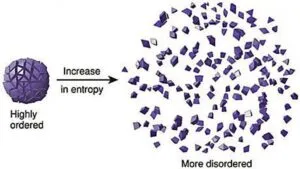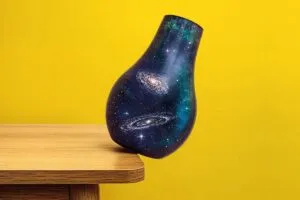How Entropy is telling us how our Existing World is Crumbling

For the past 3 weeks I have started and then not completed articles for CACOR. Bad me. It must be the summer weather, I am just in a lazy mood. I did begin what I thought was a great topic: The Lebanonization of Canada, but ran out of steam. Then, inspired by a book on Grizzly Bear encounters, which also examined how we have changed our view of the non-human world from seeing it as Creation, then Nature and finally “the Environment”, I began an examination of how our words shape how we see and interact with the World around us. I began in an excited mood, and ran out of steam again. Maybe its Entropy? Now, I hope you finally get something to read that you can really sink your teeth into, a summary of an old book [1981] that I found cleaning up the cottage with the exciting title of ENTROPY – A New World View by Jeremy Rifkin. Just as I was about to throw it in the recycling bin I took a quick look at it and was surprised that what he was saying applied to today’s world even more than in 1981. So let see what Jeremy was telling us we why we are in the mess we are in and what we can do about it.
Let’s start with the punchline.
Only by consciously choosing to respect the physical confines of this closed system we call the planet Earth can we make the radical adjustment that is essential for our continuation as a species. Our survival and the survival of all other forms of life now depend upon our willingness to make peace with Nature and being to live cooperatively with the rest of the ecosystem. If we steadfastly refuse to make the change and continue [as we have done since 1981] on our colonizing ways, destroying everything in our path, we may find ourselves with a choice in the future. We will eventually reach the critical point [now?] where the matter-energy of the planet will be so depleted that even with a complete turn-around to a climate-friendly mode, there will be too little low-entropy terrestrial endowment left to allow the natural recycling process to restore a measure of ecological balance for the continuation of life.
Wow! That’s a little harsh. He is going beyond what even the most pessimistic are saying today in that his view of entropy means that once we pass the tipping point we will never [well, perhaps in many thousands of years] be able to have enough energy/soil/resources available to attain any form similar to our complex civilization. Now let explore how he uses Entropy to come to this conclusion.
Let’s start at how Jeremy view History. He uses two folk expressions and his “Law of Entropy” to explain why we have developed our form of “civilization”. The expressions are: Happy People don’t make History & Necessity is the Mother of Invention.
“Put another way, we only being to think about change when the our present approach no longer works. Only under crises do the creative juices flow until we finally discover an alternative that works. This contrasts with the modern worldview that there is a steady line of progress in which surplus in each period provides the free time needed to invent new tools, which in turn, free even more time for the discovery of even more advanced technologies and even more surplus. However, this view is now blurring. History, is in fact, unfolding in the opposite direction. For example, hunter-gatherers took up farming out of necessity. Europeans were forced to burn coal when they had run out of wood. In other words history as change only happens when we have exhausted our existing resources and have no choice but to change – or die.”
Next the author uses his view of The Second Law of Thermodynamics which states:
When We Transform Energy it moves from an Available Form to an Unavailable Form.
The author builds upon this well known Law to explain human history, sociology and economics. He continues his view of History as Change [he explains that without change there is no History and that this change is really about changes in energy transformation methods]:
“Great changes in History happen as a result of dissipation of the existing stock of resources. What this means is that History is a reflection of the Second Law. In this way the overall Entropy is always moving towards a maximum, in that when easy resources are gone, as in wood, the resources harder to extract must be used. With every single change the total amount of energy in the Earth system becomes more dissipated. At critical watersheds, like now, accumulated increases in Entropy [climate change, species extinction, ecosystem destruction] result in a qualitative change in the Energy source of the Environment itself. Old ways no longer work. The Entropy of the Environment becomes so high that a shift to a new energy environment occurs, along with new technology and new social, economic and political structures. This is what needs to happen today, or, we self-destruct.”
It gets worse. “Entropy tells us that each shift in the environment is more harsh and exacting in terms of available energy than the proceeding one. This is because with each successive stage the stock of available energy in the world has dissipated to a lower level. The overall disorder of the world is always increasing and the amount of available energy is always decreasing. Thus human life is always getting harder and harder to sustain and that more work, not less, is necessary to eke out an existence from a more and more stingy environment. More complex technologies are always needed just to maintain a moderate level of human existence. Our current Newtonian, economic growth at all costs world view cannot stomach such thoughts. Every so called advance in efficiency only hastens the overall dissipation of energy and disorder in the world. As the process of energy flow has been speeded up in our Industrial society the period between each new Entropy watershed has shortened. It took millions of years to exhaust the environment that supported hunter-gatherers. It took thousands of years before necessity forced us to transform from an agricultural to industrial society [in Europe] and now only a few hundred years for our world Industrial society to exhaust its resource base [non renewables, I include in that picture our waste products – pollution/CO2 that degrades the environment]. We now face a new Entropy watershed.”
In other words, change or die. We can change to renewables. We have no choice. But this is not a mere technology shift. It means removing the barriers we have created between the human and non-human worlds. It means living within our means today so the future has energy tomorrow. It means living within the cycle of the Earth. It means saying good bye to exponential growth. We cannot change Entropy, but we can change the speed at which the energy we harness is dissipated. Going slower means few people using fewer resources within the energy limits of the planets renewable energy system. This is not a choice. It will happen. However, if we over shoot and hit tipping points – which may be appearing now – we have so degraded the Earth energy/resource system that any recovery will be a much lower energy base and thus lower quality of life. This degradation includes soil depletion, species extinction, ecosystem destruction and goes far beyond climate change – it is only the tip of the iceberg.
Can we do this? Of course. It is a choice, just like any life and death choice. A smoker is told to quit or die. Many die. Some quit. A drug addict is told stop or die. Many overdose. They just cannot change. I get it – change is hard. But I am convinced that you and I and all people will change, but probably only when the pain of NOT changing is more than the pain of changing. That process has begun. The weather disaster around the world will continue and accelerate and when they reach a trigger point people will demand change. Will that be too late to avoid permanent degradation of the Earth system? I don’t know. Nobody can know as it is only knowable after the fact. What I do know for sure is this: the sooner we act the better the chances that our grandchildren and great grandchildren will look back at us and say:
Thank you.
We are sitting on the edge of the abyss. We can change, with some difficulty, before we are forced to. Or we change, to a damaged world that will most certainly mean a reduced quantity/quality of life, because Entropy forces us to. It’s your choice. Its my choice. It is up to all of us to choose.

Leave a Reply